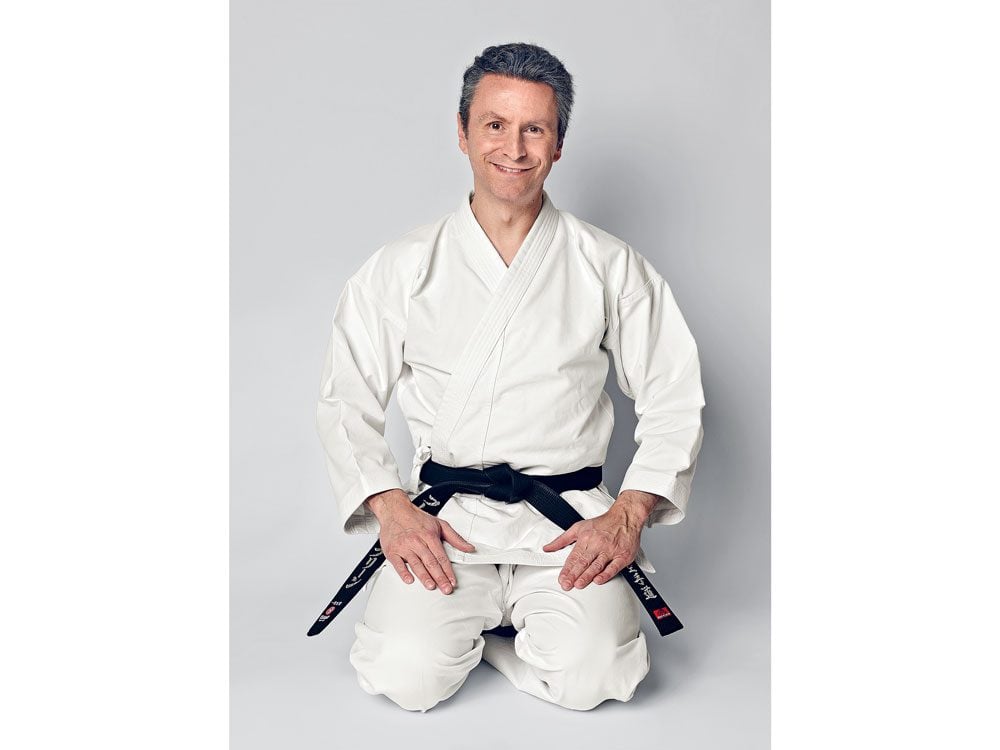This Saskatchewan Man is on a Mission to Make Martial Arts Accessible for All
Martial-arts teacher Brendan Breen adapts his classes to better serve students living with disabilities.

How Brendan Breen is Making Martial Arts Accessible
Owen Reid never gave much thought to karate. For one, the 35-year-old has cerebral palsy and needs a wheelchair to get around his home at Deer Park Villa, a care facility for people living with disabilities, in the town of Ituna, Saskatchewan.
But his indifference to martial arts vanished in January of 2018, when he was asked to join a new initiative: a local named Brendan Breen was offering karate classes. During that first weekly class at Deer Park Villa, surrounded by a handful of other students, Reid was skeptical. Still, he quickly found himself drawn in by Breen’s enthusiasm. “He got me motivated to try it,” Reid said. Over time, the kata routine—a series of movements, like punches, lunges and jumps, against an imaginary opponent—was adapted so Reid could complete it from one spot using mainly his arms.
Breen started the Deer Park Villa classes while he and his wife, Mikiko, were establishing Martial Arts Abilities Canada, the country’s first registered charity to combine karate with special needs. If a student can’t afford the $75 monthly fee, Breen will work out a lower price or waive the charge altogether.
He started teaching three years ago as a way of connecting with a sport that he’d practised decades earlier. Breen—who, when he isn’t volunteering, works as a sales rep for a company that sells protective coatings for vehicles—is known for being patient, accommodating and infectiously positive. He’s quick to adapt his methods to suit each situation. A student who has an injury that limits their flexibility? No problem.
Word of his inclusive approach spread through the small prairie town, population 700. Breen hadn’t set out to teach students with special needs, but he was swift to welcome new recruits who had autism, cerebral palsy and cognitive learning issues. “People were just kind of sending the students to me,” he said.
When he heard about a system for teaching karate to people of all abilities, he knew he had to meet its Belgian creator, Eric Bortels. Last May he had his chance: Bortels was giving demonstrations of his “inclusive karate,” or I-Karate, in Montreal. Breen flew to see him and joined the organization.
Breen quickly incorporated what he’d learned about I-Karate at Deer Park Villa. One technique is for the instructor and students to wear a red armband on one arm and a blue one on the other arm, since colours are easier to follow than “left” and “right.” Students also stand on mats that are colour-coded to simplify the commands for where they should put their feet.
That openness to new ideas has paid important dividends. One particularly emotional moment came in October when Lynnette Gaudet, a 37-year-old student with Down’s syndrome, performed the kata routine just about perfectly. “She couldn’t believe it. She was almost crying,” says Breen. “When the students achieve what a lot of people think they can’t, it touches my heart.”
There are a few areas in Canada where adapted martial arts like karate, judo and tae kwon do are offered; the Montreal-based Association for the Development of Adapted Martial Arts is affiliated with approximately 20 clubs, but those are mainly in Quebec. Breen, however, is the only certified I-Karate teacher in the country and will soon begin training teachers to lead classes in a number of provinces.
As for Reid, I-Karate gave him the confidence to accompany Breen to meet a provincial minister to lobby for funding and recognition of their program. “One of my goals was to go to the legislature and really prove to the government what I can do,” he says, to show them what Martial Arts Abilities Canada helped him realize: he can do anything anyone else can.
Next, check out these people with real-life superpowers.



